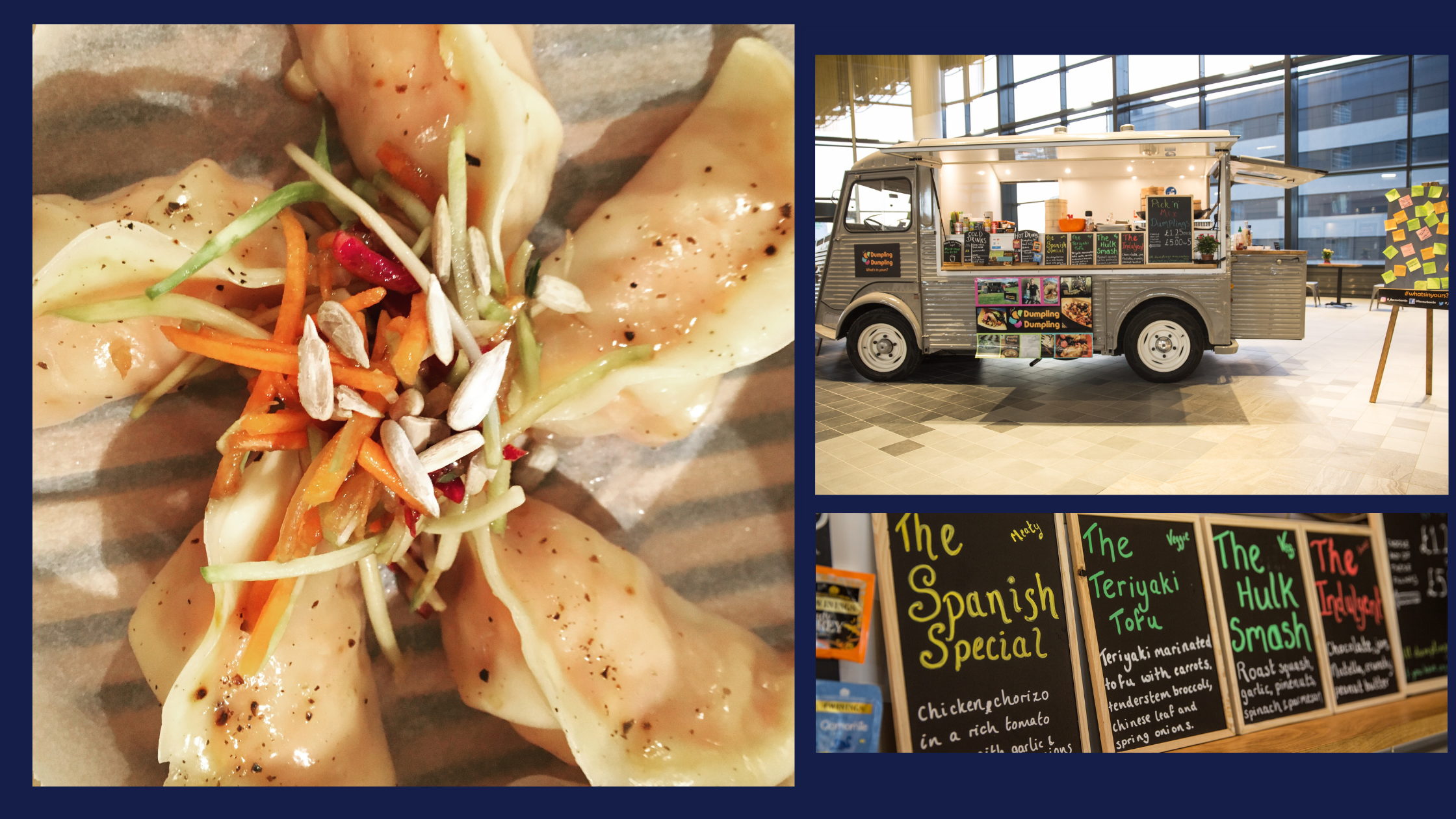I was scrolling through my Dumpling Dumpling Instagram account this week, and it brought back some interesting memories. They were a mix of triumphant moments and instances where I learned some hard lessons – but all important to remember. Dumpling Dumpling was a streetfood business I ran with my then-husband for 6 years. It put a spin on the humble but mighty Chinese dumpling, or Jiaozi. We went beyond the usual pork and chive or mushroom and water chestnut fillings, embracing unique concoctions like Lobster Thermidor, Jamaican Goat Curry, Pesto Mac n Cheese, Green Thai Curry and even Fish and Chips! However, this blog post isn’t about our culinary adventures, but more about the lessons we learned along the way.
Here are just some of the key lessons that stood out whilst looking back at these images:
1. Starting a business is a community effort.
While it’s easy to get caught up in the idea of self-sufficiency, the truth is, we need others. I remember our first big break – a concession in a new Southampton shopping centre. For us this was a big deal.
It was right before Christmas, and with an estimated footfall of 7000 people per day and a month to get ready, it was a massive undertaking. Up until that point we had fed the rugby lads at the IWRFC post fixtures and the odd-small pop-up at school fayres. It was right before Christmas and with an estimated footfall of 7000+ people per day, this had the potential of being huge.
So, I relinquished the need to do everything myself and set up a Facebook group calling for dumpling elves. Of course, I couldn’t pay them. So it was actually dumpling elf volunteers in the form of friends, family members and random people who wanted to help! And it is not a weakness to accept help!
I had a wonderful friend who had a large manor house and she allowed me to use her kitchens. Every day for the next 3 weeks I was cooking fillings, preparing the coloured dough, wrapping dumplings, teaching others to wrap dumplings, quick-freezing the dumplings and packing them all up. At night I’d head home, hands falling off, and ensure our documentation, licenses, website, social media pages, cooking equipment, trading vehicle were all ready to go for the launch. I had many moments of doubt, BUT we made it.
By the time we started we had 4000 dumplings ready to go and looked like a proper little business. And I COULD NOT HAVE DONE THAT WITHOUT THE PEOPLE (nor would I have wanted to).
2. Embrace the art of compromise.
In the early stages of a business, it’s easy to get attached to your original vision. A deviation is hard to accept that early on. It feels like a little failure having to let an idea go because of cost, physical constraints, time issues or any other external factors. Someone told me “you can’t be a purist with everything, and that’s ok”.
everything, and that’s ok”.
Know what’s important to you and your customers and stick with that. It got to the point in that first month that my dream of having rainbow-coloured dumplings was causing more hindrance than helping us achieve our goals. What I wasn’t willing to compromise on was flavour. It is a food business after all. I wanted every dumpling to be a flavourbomb. So, in week 2 of the above when I was running out of time and energy I found a supplier of dumplings wrappers. This saved me hours and reduced the RSI I was developing in my wrists!
3. Understand the importance of roles.
A team functions best when everyone knows their roles. Base roles on your individual team members’ strengths and weaknesses. Encourage them to try something that might be out of their comfort zone initially, as they might find their true calling. Role assigning and playing to strengths, not only ensures efficiency but also fosters a sense of responsibility and ownership. There was nothing better when we were at a festival or experiencing a busy lunch-time stint at a food market. Everyone was in position, and we all knew our roles inside-out…and things ran like… well, clockwork. It was a beautiful thing, and made it an enjoyable experience.
4. Love the need for innovation.
Not every idea will hit, that’s ok. Don’t be afraid to experiment because if you don’t you’ll never find that winning recipe. Customers don’t really know what they want. It is your job to show them. When they’ve got it, they’ll tell you. Covid-19 forced us to change the way we did things. Festivals weren’t happening, the regular stint we had at a food market in Portsmouth shut down. What were we going to do! A pivot was needed! Takeaways were the answer! And after Covid-19 it allowed us to have a steady revenue stream in addition to the festivals!
market in Portsmouth shut down. What were we going to do! A pivot was needed! Takeaways were the answer! And after Covid-19 it allowed us to have a steady revenue stream in addition to the festivals!
5. The power of feedback for growth.
It can be daunting to speak to customers, particularly when you’ve put your blood, sweat and tears into developing your product. Are you ready for the honesty? The potential rejection? At Dumpling Dumpling, we were always experimenting with new flavours. Some were instant hits; others didn’t quite hit the mark. But each attempt taught us something valuable about our customers’ preferences. Also it’s important to remember, one man’s pleasure is another man’s poison – you aren’t going to please everyone. But if you don’t talk to your customers you won’t know. I have met many business owners who believe that they know best and the customer knows nothing. I don’t believe the customer is always right, but you have to listen to them to be better. There are learning opportunities everywhere. Every conference, event, discussion has the potential to teach you something.
As I look back on my Dumpling Dumpling days, I realise how those experiences have shaped me into who I am today. These lessons are universally applicable, and I believe they’ve made me a better leader and team member. Thank you for listening to my ramblings and I hope my reflections resonate with you in some way, I’d love to hear your thoughts.
your thoughts.



